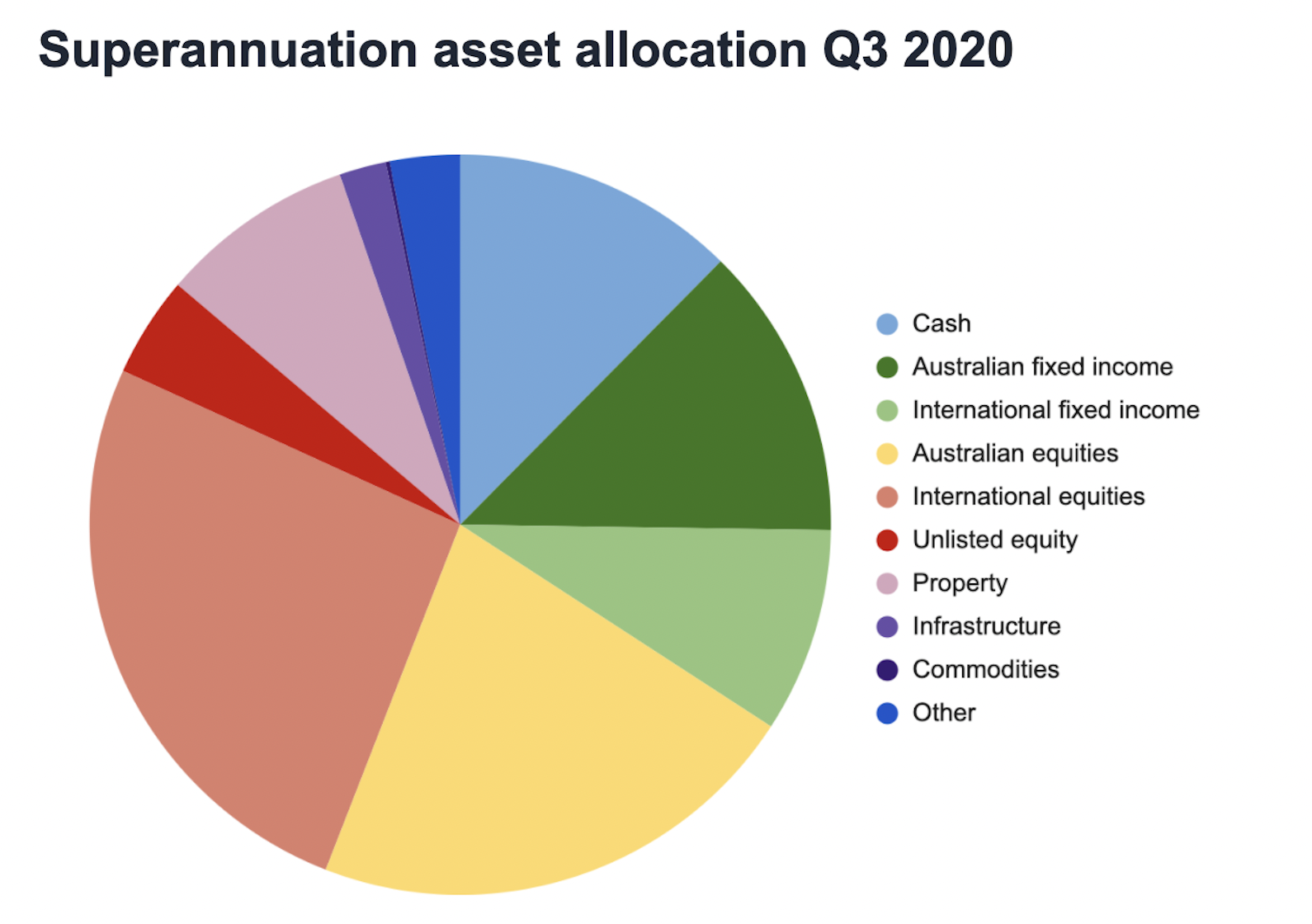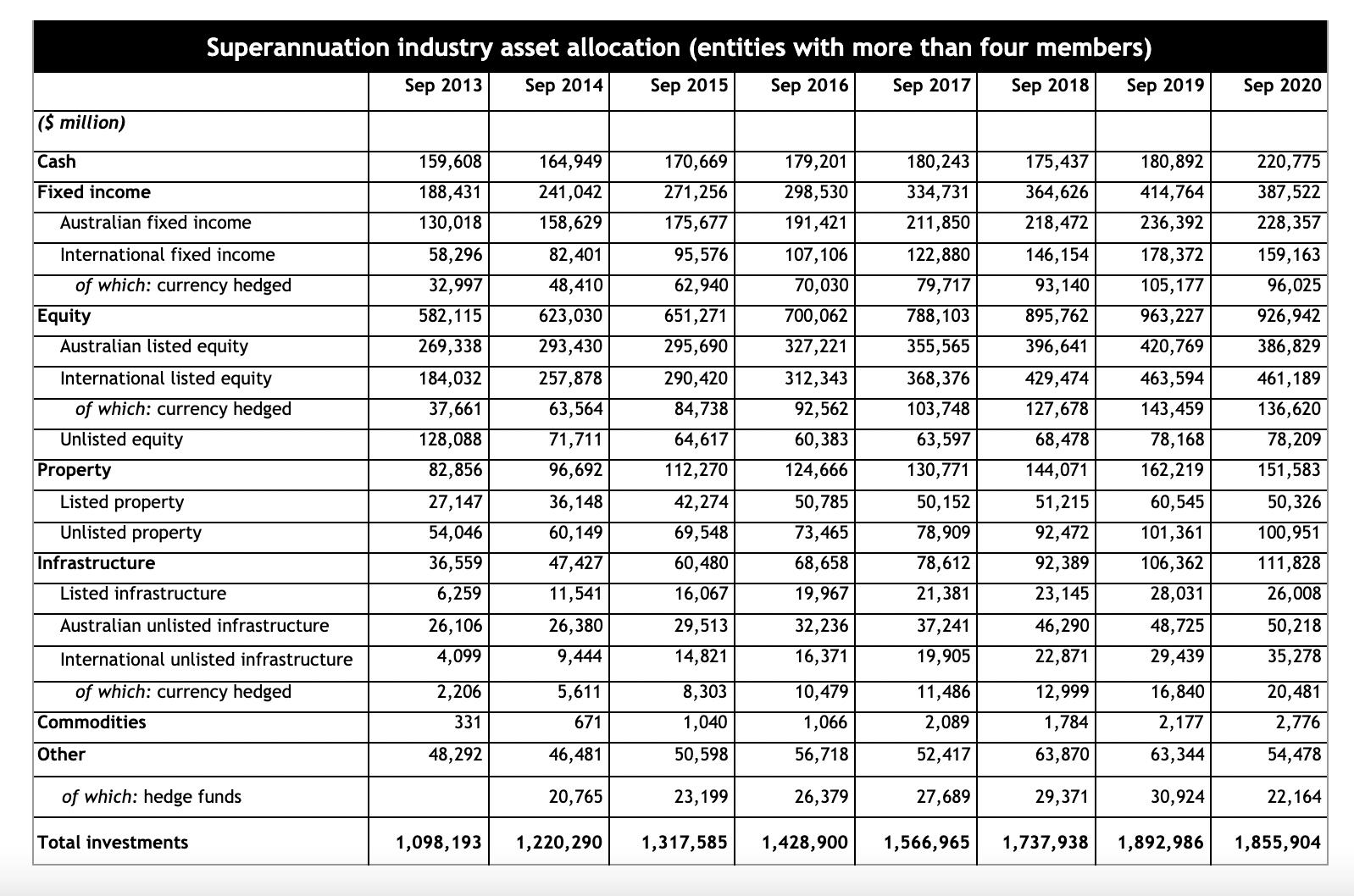Superannuation leaders: Don't put it all on red
What with all the wild, speculative share price swings of late you may have experienced a niggling urge to throw your hard-earned cash at the next big thing you read about online.
I know I have.
Still, who can blame our fascination with skyrocketing stocks and - deep breath - cryptocurrencies? It's hard, if not downright impossible, to not throw your investment strategy to the wind and hurl your money instead at a relatively-unknown-and-promising-tip shared in a Reddit thread, or by your overly-eager Uber driver.
But while legendary investor Stanley Druckenmiller believes it's wise to put all your eggs in one basket (provided you watch them very, very closely) the custodians of Australia's nearly $3 trillion superannuation system suggest otherwise.
Diversification, they argue, is the key to sailing through the murky waters of investment markets. It is the mantra super funds live and breathe, the guiding compass used to manage asset allocation and provide long-term growth opportunities for members.
In this wire, four superannuation leaders, including AustralianSuper head of total portfolio management Alistair Barker; Australian Ethical chief investment officer David Macri; Aware Super chief investment officer Damian Graham; and Colonial First State's general manager of investments Scott Tully, explain how they are positioning their portfolios for the year ahead, and why you should refrain (or at least try to) from putting it all on red.
Fear and loathing in low interest
With cash and bonds offering dismal returns, super funds have had to look for alternatives to bolster their defensive allocation, and instead, turned their eyes to equities and unlisted assets in their search for yield.
Colonial First State's Scott Tully revealed the $144 billion wealth management group uses absolute return fixed income strategies, credit and equities as their go-to for defensive yield.
"If you invest like us or if you're just a smaller investor, money is going into equities almost by default because you just don't have that range of investments that you had when interest rates were higher," he said.
"There was some very short-term silliness going on, but I think it is symptomatic of the fact that there is this propensity for people to be investing and trying to get higher returns than their term deposit."
Aware Super's Damian Graham agrees, arguing its almost impossible to find yield in cash and fixed income markets in the current environment.
"I think some of the real asset markets can still generate some real yield, and obviously equities are offering some yield as well," he said.
Australia's largest super fund, the $200 billion AustralianSuper, has still been using bonds to control risk in its portfolio but has also been using FX as a diversifier.
"Cash and bonds are very unattractive as a long-term investor as they offer very low or no return and may not be as diversifying as they have been in prior cycles," AustralianSuper's Alistair Barker said.
"Given the outlook for bonds and cash, FX is an increasingly important diversifier in the portfolio. We have held a higher allocation to FX for a number of years leading into COVID although have been reducing it more recently on expectations of AUD strength."
Meantime, Australian Ethical's David Macri said the $5 billion wealth management group continues to use fixed interest to cushion the blow of a potential drawdown.
"We currently invest in Australian fixed interest only," he said.
"We decided to delay establishing a position in international fixed interest last year because it would extend the duration of the overall portfolio and lower its yield."

Lock, stock and several smoking buys
While cash doesn't tickle any of our superannuation leader's fancy, the CIO of Australia's second-largest super fund, Aware Super, noted in a recent webinar that the $135 billion wealth giant is currently holding a lot of it.
"We're not holding cash because we think that's the best place to be. For instance, we're not saying that that's a defensive position and we think the equity market is going to fall in the near term," Graham said.
"It's more about just having some additional capacity to buy new assets as we see them come to market. And we are starting to see some really good opportunities."
And its opportunities aplenty, according to Graham, with the super fund increasing its exposure to unlisted assets and international equities over the past few years. Over the coming 12 months, Aware Super will set its eyes on opportunities in private markets, infrastructure and property, and won't be increasing its exposure to equities.
Macri, in comparison, said Australian Ethical continues to uncover undervalued and under-appreciated opportunities in equities, particularly in the small-cap space.
"Some examples of current positions include Healius (ASX: HLS) which has exited its capital intensive medical centre business, Genworth Mortgage (ASX: GMA) which trades below NTA and may benefit from any strength in the housing market and Vocus (ASX: VOC) where we think there is corporate appeal in the infrastructure-like qualities of the fibre network," he said.
Still on the equities train - Tully doesn't believe there to be any "screaming buys" in the current market - "unless you want to be contrarian and buy the next GameStop". That said, he is bullish on Asia and emerging markets.
"Investing in Asian equities and emerging markets seems to be the current consensus on where funds are flowing - and that's a bit of an outworking of what US investors are looking for and movement in the US dollar," he said.
"If you're not investing in emerging markets, Asia, or China, then you're missing out on quite a bit of the world's GDP. You could invest all your money in the US, but that is just one country, albeit a very big one. You want to get exposure to these different growth drivers."
But Barker has backed unlisted asset classes for the year ahead, arguing there are attractive opportunities within the private equity, infrastructure and unlisted credit arenas.
AustralianSuper has also invested a significant amount of cash in capital raises since the onset of the pandemic, he said, and will now be turning its gaze towards venture capital and emerging industries, with an aim of investing $1 billion over the coming year.
This includes a commitment of approximately $700 million to Australian venture capital funds, a dedicated in-house investment team focused on identifying and investing in small, early-stage ASX-listed companies, as well as an investment in a start-up affordable housing provider, Assemble Communities.

Source: ASFA superannuation statistics, 2013-2020
The (imminent) Hangover
There has been an unsettlingly brisk shift in investment outlook recently from bullish to a bearish view. Perhaps it's because investing greats like Jeremy Grantham have started to sound the alarm on a potentially catastrophic crash - not years, but months away, forcing investment professionals to reassess their cards.
However, the superannuation leaders who provided commentary for this wire were still bullish on equities over the year ahead, arguing sky-high valuations were justified by record-low interest rates and bond yields.
Aware Super's Graham said the super fund was still "very well exposed" to equities, despite their high prices.
"We're not foreseeing an imminent pullback, but you rarely do," he said. "We are in a period of time of very high valuations, and very low margins of safety."
To avoid catastrophe - or wealth destruction at any rate - Tully recommends investors diversify across asset classes and geographies to limit risk.
"Because you do have uncertainty in all markets, once you've set your risk tolerance, spread your money across a range of countries and asset classes, because the next well-performing sector - or the next downturn for that matter - could be in areas that you don't foresee," he said.
"Don't put it all on red. Or if you do, it’s important you’re aware that you could lose it all."
Macri also believes portfolios should be "resilient enough to withstand shocks so that long-term objectives can still be achieved". However, he argues it isn't appropriate for investors to position their portfolios in anticipation of highly unlikely events.
"As always, threats are numerous (such as a more severe strain of the virus, ineffective rollout of the vaccines, inflationary pressures leading to a relatively fast increase in bond yields, climate change, to name just a few)," he said.
"The objective, however, is to build resilient portfolios that will meet long term risk/return objectives. "
Tully believes there to be two major threats in relation to the rollout of vaccines.
"One is that if that doesn't play out as expected then there will be some impact on markets," he says.
"Maybe there are not enough vaccines that are effective, or they prove to be less effective on different strains and we have a longer period where the economy doesn't recover. Markets are very much priced on that expectation, so if it doesn't occur, you may find that the market pulls back."
The second is that the vaccine and its rollout are effective, but because central banks and governments pumped so much money into the economy we see inflation, Tully said.
"While that's not necessarily a bad thing, there are some investments that have done very well on low-interest rates," he said.
For example, 10-year bonds are priced very low. If yields rise prices will fall and investors will lose money. Likewise, some of the big tech stocks that have been assisted by lockdowns and low-interest rates could experience a sell-off, he warns.
(Movie puns aside) just what does this all mean?
The message here is stick to your investment strategy. Once you know how much risk you can tolerate, allocate your portfolio accordingly to the various investments that work for your investment horizon, needs and wants. If GameStop's your bag, so be it. But as Tully says, "don't put it all on red. Or if you do, it’s important you’re aware that you could lose it all."
2 topics
3 stocks mentioned

